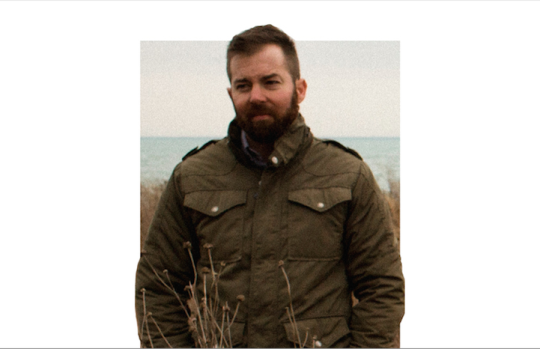
As quietly unassuming as Brian Cook is in person or over the phone, the bassist has spent the last decade playing to the deafening other end of the spectrum, whether with the hugely influential Botch or These Arms Are Snakes, or in his current and longstanding role in instrumental metal band Russian Circles. Cook’s talents aren’t limited to the stage, either. Alongside his musical work, he’s written for various publications as well as his own personal blog. Cook’s distinctiveness as a musician draws primarily from an exploration of textures and an instinct for restraint over flippant composition. It’s a characteristic that in many ways mirrors the kind of contemplative nature he exudes in conversation. I recently spoke with Brian to talk about the non-metal music he’s always found himself returning to and why narratives make all things better.
You have a fairly wide array of music you listen to, and country is one I’m assuming you have at least a passing interest in, right?
Yeah, I feel like I’m a dilettante in most realms of music where I just find a handful of things in any genre that I’m really excited about, and then I have a really hard time getting immersed in anything beyond a handful of artists. The only kind would be 90s hardcore where I feel like I have any sort of real authority over the whole genre. Everything else is kinda pick and choose. But yeah, American folk music and country is something I’ve always been fascinated by just because a lot of it is the basis for early rock music, and I guess I hear a lot of that in the straightforwardness and simplicity of it. I think it also comes down to where I like music that’s complex and challenging, but then again I’m also gonna always fall back on things that can really command three chords and make something interesting just out of that. If you can make something out of three chords then you’re really doing something right, and I feel like country music kind of plays into that a little bit.
It’s funny because I grew up listening to Roy Acuff, and there is something about the simplicity of that verse/chorus, three-chord structure that has staying power. Growing up since then I’ve seen that same thing applied in other genres as well, with punk being a prime example. It’s deceptively simple because there’s a lot going on when an artist is able to use the basics to accomplish something much more complex.
Yeah, totally. I think it’s Woody Guthrie that said “If you’re using more than two chords, you’re just showing off.” I feel like most people in my generation got their musical legs in punk rock music, and I think it’s because it’s so simple and it’s something that’s very empowering when you’re like “Oh shit. It’s just power chords? That’s so fucking easy.” I remember finally learning about power chords and it was like oh my god, every fucking rock song is just power chords. It was like this whole world opened up – the fact that people who’d made so many different types of songs were just using the simple structure of three chords or four chords or whatever was really fascinating when I started off. Then at some point you can maybe get too proud of yourself and go “Oh, well I need something more complex and meaningful than that,” but again I think it’s the same kinda thing you were saying with Roy Acuff. You get older, and it’s like “Holy shit, you know what’s really awesome? You can fucking write a really good song with three chords, and that’s all you need.” I think making more out of less is somehow more gratifying to me now as I’ve gotten a little older.
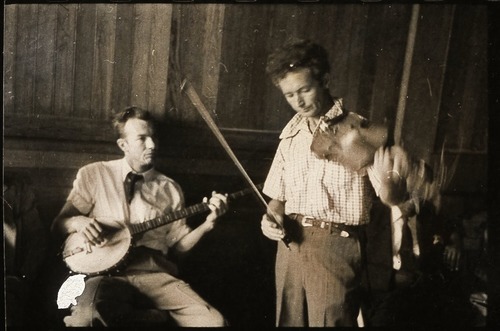
I think there’s a lot to be said for simplicity especially when today’s culture is increasingly more adept at discarding music and art.
I think that’s sort of the depressing thing about modern music is that it’s so easy to make and so easy to get it out there into the huge canon of contemporary music, but it’s so hard to make something that’s really compelling and really stands out. I think a lot of times people will fall back on something that’s flashy or very groundbreaking texturally or will have a very interesting backstory in terms of “We recorded this song in a cave or in a castle or whatever.” It’s so mystical and the mythology behind it’s so fascinating, but if you actually just write a song that will catch your ear but not wear itself out after one listen I think is really trick. For me that’s the real challenge is to figure out how to make something where people will listen to it, they hear it, and then they wanna listen to it again even if it’s just out of curiosity or trying to figure out what they just heard, and then drawing more people in so that it’s kind of a lasting piece of music that will come back instead of burning themselves out on it after a week.
Where did it all start for you initially – that discovery of music and realization that you could and wanted to play? Was it heavy music or was it something else?
It wasn’t heavy music at all, and maybe something about that is very tied into the type of music I fall back on in my leisure listening. The first song I remember being sort of obsessed with was “Cats in the Cradle” by Harry Chapin. I remember being five and that song would come on the radio on whatever station my parents listened to, and I was always really excited when that song came on. I think a lot of songs from then on that always sort of popped out at me were things like that or Neil Diamond ballads, Simon and Garfunkel songs, so there’s always this attraction to sort of narrative songs with some folk leanings to them. As I got a little older and got more into pop music and things like hair metal and stuff like that, the entry point for me was always the ballads that they would have. I didn’t like Motley Crüe until I heard “Home Sweet Home.” It was always shit like that where I would be like “Oh okay, this I can understand,” and then I could wrap my heard around the more obnoxious elements of what the band was doing.
Does that mean you’re a big Journey fan, Brian? Because Journey are magic.
I somehow missed out on Journey, but I was a big fan of Survivor. That was a big one. I like some Foreigner. I was really big on Chicago, especially the 80s era of Chicago. My first cassettes were Chicago cassettes. My entry point was really sort of wimpy rock music that was more geared towards balladry, I guess.
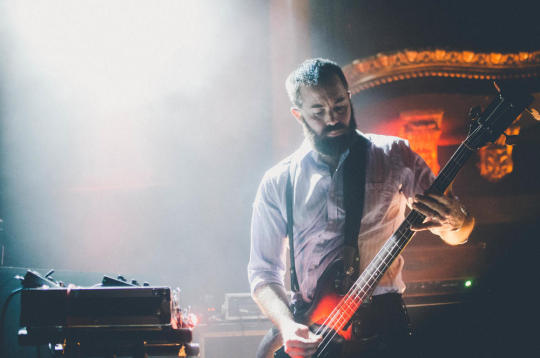
photo by Allen Wan
It’s interesting because a lot of those bands like Chicago or Boston are being more and more embraced or at least less dismissed as uncool or whatever the hell.
Boston’s funny because I have some friends that are metalheads that are a little bit older, and they’re just like “Ugh. Boston.” Really? The first Boston record? How can you hate on the first Boston record? There’s not a bad song on there. Pretty much every song on that record is a hit. I’m sure if it was the early 80s, and I was really into Venom and Iron Maiden, Boston would seem pretty wimpy, but I think now living in this decade and not having that sort of context, you can go back and listen to Boston and realize those are fucking great songs. I think sometimes having a little distance from the original context of something can actually make it better. Journey’s kinda the same way. I know some people now that have come to embrace Journey. It’s great music. It’s not Led Zeppelin great, but there’s nothing to be ashamed of in liking Journey anymore in a kind of interesting turn of events.
Seems like time and retrospect have served a lot of those bands well. That said, some bands still maintain that kind of trademark pariah status for whatever reason like Rush, for example.
I think that one’s weird, too. I love Rush, but I also came to Rush kinda backwards. The first time I heard “Tom Sawyer” to me it sounded like classic rock mixed with Nomeansno. It sounded like The Who with Nomeansno’s rhythm section, so I’ve always loved Rush since that point, but I realize that my take on it’s probably a little backwards from what most other people approach it from. It’s always weird, though. I was reading an interview with Jeff Tweedy, and he was talking about ABBA, and he was just like it’s a shame that people really fucking hated ABBA. Maybe it’s what ABBA represented at the time because it was just total bubblegum pop music. It’s understandable why if it was this very modern thing it would be seen as being disposable ephemera, but now it’s like looking back who really can hate ABBA? Who can really hate those songs? They’re about popular culture, they’re well written and well recorded. It’s easy to not be an ABBA fan, but to hear “Knowing Me Knowing You” and be like “Ugh. What a fucking pop venture,” and it’s not. It’s just a fucking song. It’s a well-written song which is what people hate about it.

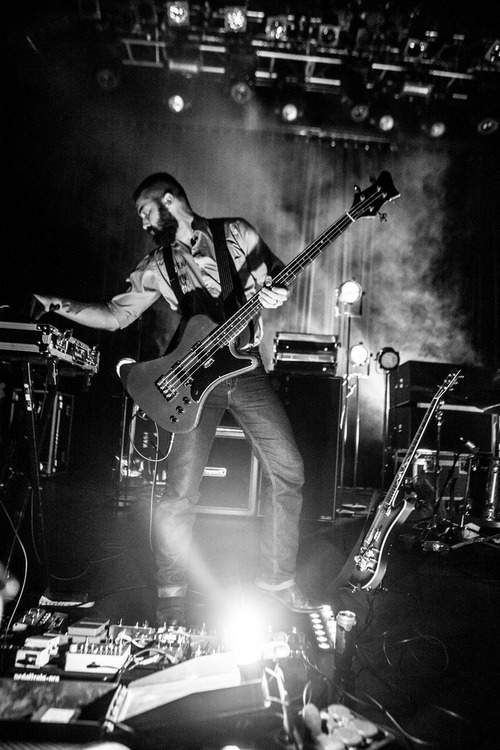
I wanted to go back to your comment earlier about listening to songs with narrative or that are viewed as more complex. Do you see that kind of early fascination with the folk music and acts like Simon and Garfunkel as a sort of precursor to you becoming involved with writing yourself?
I think so. “The Boxer” is a great song. I remember Tracy Chapman’s “Fast Car” coming out when I was in fifth or sixth grade, and I remember that song really fucking me up. It was so depressing to me as an eleven or ten year old. It was like Jesus Christ. That song was dangerous to me. [Laughs] I was really terrified when the song would come on the radio, because it was like this is the kind of song that would drive people into depression. I was fascinated by that. I couldn’t believe people could write a song that was so dark and depressing. I was approaching that age I was realizing that a lot of the music I liked was sort of empty. Here I am trying to talk about how ABBA is such a great band after all, but at the time hearing that kind of music I was like “Oh, the melodies are great, but what are they actually trying to say?” I think it was hearing things like Dead Kennedys and Minor Threat where it was like “Whoa, these people actually have something to say.” Tracy Chapman or Simon and Garfunkel and others had these heavy lyrical meanings in their songs. In the case of Dead Kennedys it might be something more topical or specific socially, but to me that came across as being more genuine and more real because it was about something and wasn’t just about abstract, very generic feelings, or love, money, or dancing or whatever. Which is what most pop music is singing about. I really got into things that were very intense lyrically, and I think it really jumped off from punk music. I actually ended coming back to American folk music when my brother made me listen to Bob Dylan, and I remember listening to Blood on the Tracks, and just thinking “Holy shit! This is a very lyrically dense record,” and it’s a record that I still listen to constantly and still find really fascinating because there’s so much to untangle lyrically on that record. I think the type of music that I enjoy now has a strong lyrical component. There just has to be something going on lyrically to keep it compelling. Empty, vacuous lyrics can easily ruin an otherwise great record or great artist for me. I still think a narrative is kind of crucial for me.
That kind of goes against the general consensus of metal fans who say that lyrics are essentially unimportant, and I think there’s a lot of truth in that but I also think there’s a tendency to be wholly dismissive of the value in lyrics.
I think that’s one of the things I often find problematic about a lot of heavy music. I feel like a lot of it is sort of unsatisfying from a lyrical vantage point. A lot of the times I feel it adds texture or maybe some other extreme element, but it doesn’t really add another dimension to the music, and that can be kind of frustrating. A lot of what I’ve always gravitated towards musically is still sort of punk and hardcore, so a lot of the bands that I listen to like His Hero is Gone have really amazing lyrics that are dark, but you can definitely tell they’re about certain situations. It’s not Bob Dylan level of beat poetry put to music, but you still know what they’re fucking singing about and that makes it all the more impactful. I guess the more grind-based metal bands where it’s just the guttural vocals you think well, okay, it’s not really there for any other purpose than to have a frontman for the band. There’s still stuff about that music that I appreciate on a different level, but it’s a more basic level I guess.
You’ve published a book, The Second Chair is Meant for You, and you maintain a fairly steady presence in other areas writing for various publications. Does music inform your writing, or do you see those two things as being mutually exclusive?
I think there’s some crossover. I definitely like writing just because it’s a little easier to articulate very specific ideas. I think a lot of times when you have something to say, and you’re trying to say it in a song, you can get held back by rhyme and meter. A three-minute song isn’t always the best format for tackling a very complex subject. Sometimes it’s just easier to write about it and say what you want to say. But there’s also the inverse where you sometimes can’t convey an idea or an emotion just through the words. It just comes across as words, but music has a certain quality where you can make someone feel sad or get the idea of sad or triumph or anger across through the inflection of notes, and that can be a lot easier. With writing I feel like it was sort of an outlet to get more specific ideas that I had out there, but I also feel like it informs my music. A lot of times I’ll have a scene in mind or a setting that I’m envisioning but having music in the background that sort of plays in with that theme really helps get it down on paper for some reason. I think they’re sort of intertwined. They aim to compensate for what the other end of the spectrum can’t do, if that makes sense.
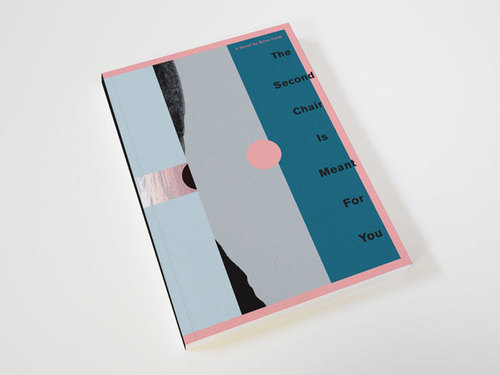
With the musical project Roy you definitely explored those ideas of lyrical narratives. What was the origin for that project? Do you see that as kind of the culmination of that love you have for folk music and writing?
Yeah, definitely. I mean, that band came together as Botch was winding down. With Botch we were always touring with other heavy bands, and it was just heavy music night after night. When we were in the van we’d never listen to heavy music. Ever. [Laughs] I think every once in a while someone would listen to Tool or something but otherwise it was listening to Oasis or Belle and Sebastian or Neutral Milk Hotel or for a while there we were listening to Dixie Chicks because we thought it was funny, but I think we all sort of secretly liked it. But it was like listening to anything that wasn’t loud and heavy because we were listening to so much loud and heavy music night after night. I specifically remember having this conversation on one of the tours that we were on. I think it was when we were out with Jesuit and Dillinger Escape Plan, but we were all out at some friend’s house barbecuing that night and people started talking about their favorite records. It was interesting because everyone was throwing out something like OK Computer or The Queen is Dead and all these sort of formalized pop records, and someone just said “If these are what our favorite records are, why are we playing super heavy, obnoxious music?” Obviously I think everyone who was involved in all of those bands was very passionate about what they were doing, but when you’re not aiming for something higher or aiming something that you really love, why not try and write a record based around what your favorite artist did? I think that kind of planted the seed in my head of well, it would be kind of fun to try to do something that’s more sort of what the majority of my listening habits were at the time like Camper Van Beethoven or Neutral Milk Hotel. It was 1998, and that stuff still seemed really new and interesting and fresh to me. The opportunity to be a lyric writer and formulate something very specific lyrically was really appealing, so over the course of however many records we did was finally getting to get out all of these opinions and anecdotes and stories that had built up. It was an outlet that I’d never had before and really haven’t had since that in terms of playing music. It’d be super fun to do again. We never really broke up. It just sort of got to the point where we were always kind of a miserable live band because we didn’t really rehearse enough to be good live, and everything just got kind of busy. I think it was just one of those things where it was a lot of like the country folk stuff we were talking about earlier where there’s the simple three chords, and it was like “Okay, we tried those three chords. Now let’s try five chords,” and things just got sort of complicated until the point where I was playing beyond my guitar playing abilities and singing stuff that was basically hard to sing while playing those complicated guitar parts. My interest in developing musically outpaced my technical ability and that didn’t really help the process.
What’s on the horizon for you both with music and writing at this point?
I don’t really know. We’re sort of winding down with the touring on this record. We have a few more things left to do like our ten-year anniversary shows. Until then we’ll be writing and working on a new record and gearing up to do the whole circuit all over again. Musically outside of that I don’t really have a lot. I played on a record with Aaron Turner and Nick from the band Baptists. I think that comes out next year, but that was really just Nick and Aaron, and I was the fill in guy for the time being while they figured things out. We’ll see what happens with that. I think the record’s really cool and hopefully people will like it.
Read more of Jonathan’s interviews at SteelForBrains.com
Russian Circles is on tour in Europe with Helms Alee
See Dates Here
via The Farm Family